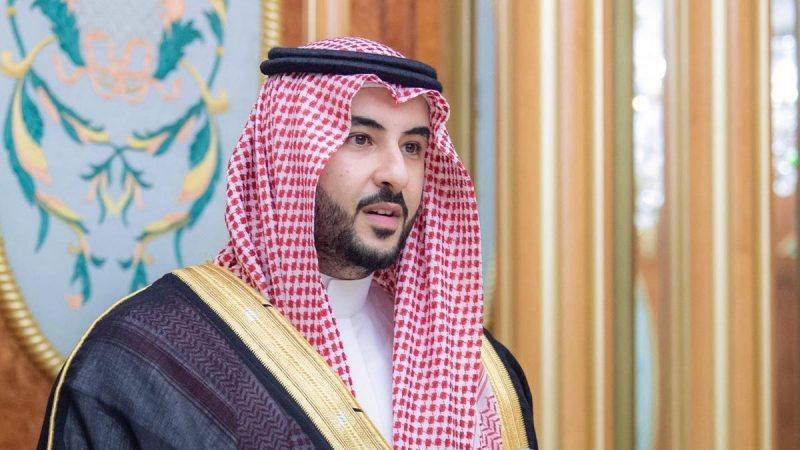Saudi Arabia’s defense minister is set to visit the White House this week in a bid to tamp down regional tensions in the Middle East after the kingdom reportedly shot down a missile fired from Yemen that was intended for Israel.
‘I can tell you that Saudi Arabia wants to make sure that the U.S. fully understands the humongous ramifications of the Israeli ground invasion into Gaza,’ Salman Al-Ansari, an independent Saudi Arabian geopolitical analyst, told Fox News Digital. ‘Riyad wants D.C. to think critically and to not fall into supporting decisions that may fire back at the U.S. interests and the whole region.’
Saudi Defense Minister Khalid bin Salman is set to visit Washington on Monday to talk with senior Biden administration officials, Axios reported after speaking with three sources with knowledge of the trip. Bin Salman, the brother of Saudi Crown Prince Mohammed bin Salman and former ambassador to the U.S., would be the highest-ranking Saudi official to visit Washington since Biden took office.
The meetings will include national security adviser Jake Sullivan, Secretary of Defense Lloyd Austin, Secretary of State Antony Blinken and several others, according to the report.
Saudi Arabia warned Saturday that ‘any ground operation by Israel would threaten the lives of Palestinian civilians and result in inhumane dangers.’
Israel’s much-anticipated ground offensive has seen a number of delays as the U.S. and other Western allies urge Israel to hold off until the release of the 220 hostages believed held by Hamas. Israeli Prime Minister Benjamin Netanyahu on Saturday night announced that the Israel Defense Forces (IDF) would implement the ‘second phase’ of ground operations, but fell short of announcing or initiating any wide-scale offensive.
Al-Ansari cast doubts on whether Israel would ever initiate such an offensive, instead suggesting that the much-touted offensive was nothing more than propaganda for both ‘local and international image.’
‘I highly doubt they will do it,’ Al-Ansari said, explaining that he believes the Israeli cabinet ‘is in complete disagreements about everything’ regarding how to proceed with its response.
‘The U.S. should give hints to Israel that Netanyahu needs to back off,’ Al-Ansari said, adding that Netanyahu ‘will keep making more historic mistakes over and over.’
Tensions in the Middle East remain high following a Hamas terrorist attack on Oct. 7 that killed 1,400 Israelis and saw Hamas kidnap over 220 hostages – some of whom have been released in the following weeks.
Israel responded by pounding the Gaza Strip with systematic bombings and shelling against Hamas military targets, but collateral damage has reportedly resulted in over 8,000 Palestinian deaths, including many women and children, according to the Hamas-backed Gaza Health Ministry.
Hezbollah militants in Lebanon and Houthi militants in Yemen have launched attacks against Israel since Oct. 7, threatening to spill the conflict out across the Middle East.
The USS Carney shot down four cruise missiles and dozens of drones launched from Yemen by Iran-backed Houthi militants, but the Wall Street Journal reported that Saudi Arabia shot down a fifth missile launched by the Houthis in a move to protect its airspace.
The Saudi Arabian Ministry of Foreign Affairs did not respond to a Fox News Digital request for comment regarding its actions, which some have claimed amount to a defense of Israel, though Al-Ansari insisted that Saudi Arabia acted to protect its airspace.
‘Disregarding the conflict in Gaza, it is evident that Saudi Arabia, akin to any nation globally, will intercept any missile traversing its airspace, regardless of its intended trajectory,’ Al-Ansari said.
‘Undoubtedly, the Iranian regime orchestrates these proxy actions, and Saudi Arabia will unfailingly prevent these tumultuous launches from going unchallenged,’ Al-Ansari added, stressing that the Houthis – as well as Hezbollah – continue ‘menacing’ Saudi Arabia and remain ‘active threats’ to the kingdom.
Pentagon spokesperson Pat Ryder said while Iran did not ‘explicitly’ order the attack, the department believed that, ‘When you see this uptick in activity and attacks by many of these groups… there’s Iranian fingerprints all over it.’
Relations between Saudi Arabia and Iran remain a significant point of geopolitical tension in the Middle East, with each country seeking to take a leading role on opposite sides of the Muslim divide: The Kingdom of Saudi Arabia boasts a population of 90% Sunni Muslims compared to Iran’s equivalent population of Shia Muslims.
Iran and Saudi Arabia agreed to a Chinese-brokered normalization deal, resuming diplomatic relations after an eight-year pause. Part of the deal included Iran’s agreement to halt covert weapons shipments to its Houthi allies in Yemen – a move that the Journal reported could ‘inject new momentum into efforts to end one of the region’s longest-running civil wars.’
Al-Ansari cautioned that the question of normalization between Saudi Arabia and Iran remains to be seen ‘when and how’ it may come to fruition – a ‘revelation that only time will unfold.’
The attack on Israel and the subsequent response have proven a slow but galvanizing issue for the region that has appeared to help with those questions of alignment: Arab nations took tepid or even outright dismissive stances in the aftermath of the Hamas attack, followed by strong condemnation of Israel after an apparent bombing at a Gaza hospital.
Hamas immediately blamed Israel for the explosion at Al-Ahli Arab Hospital, but several intelligence agencies from the U.S., the U.K., France and Canada have independently confirmed it occurred due to a rocket misfire from the militant group Islamic Jihad.
In an op-ed published Saturday in The New York Times, former U.S. envoy to the Middle East Dennis Ross claimed that he had spoken with allies across the Middle East during the past two weeks and found that Arab officials understood ‘that Hamas must be destroyed in Gaza.’
The Arab officials allegedly claimed that any perceived victory for the terrorists ‘will validate the group’s ideology of rejection, give leverage and momentum to Iran and its collaborators and put their own governments on the defensive.’


